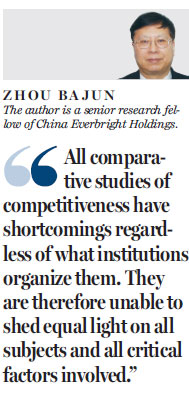Hong Kong must keep a clear mind about its strengths and weaknesses
Updated: 2016-06-08 08:12
By Zhou Bajun(HK Edition)
|
|||||||
Some authoritative research institutions recently released three studies on international economies which all feature Hong Kong prominently, although the pictures of Hong Kong's economy that they paint are not the same. Thus, one may ask, how do we know the pictures are complete and accurate?
A widely quoted report published on May 25 said the latest billionaire index by Bloomberg and estimated GDP values presented by the International Monetary Fund (IMF) indicate the total worth of the 10 richest people in Hong Kong equals 35 percent of the city's GDP. That percentage is much higher than the top 10 billionaires in any other economies around the world. For example, the 10 wealthiest Indian citizens' total assets are worth just 5.2 percent of the country's GDP, compared to a mere 1.4 percent on the Chinese mainland. In Europe, meanwhile, Sweden is the highest at 25 percent but still 10 percentage points below Hong Kong.
According to that report, Hong Kong boasts the highest concentration of wealth in the world, but a close examination of the main variables would expose some crucial flaws in the equation. One major flaw is that the GDP value of each economy is vastly different from the one it is compared with in the report; the other is that the personal assets of the top 10 billionaires have been accumulated over a much longer period of time than one year, which is the time span of the GDP estimates. Take the comparison between Hong Kong and the mainland, for example: Hong Kong's total GDP value is just a fraction of the mainland's, but the 10 richest Hong Kong people have had much more time to build up their wealth than their mainland counterparts.
Objectively speaking, the excessive concentration of wealth in Hong Kong should by no means be ignored, but that is no grounds for making it a "sentimental" issue either, considering social divisions between the rich and poor in Hong Kong are already quite strong today.
In the 2015 Chinese Cities Competitiveness Report, released by the Chinese Academy of Social Sciences (CASS) on May 30, Hong Kong was in second place behind Shenzhen in terms of comprehensive competitiveness for the second time since the two neighbors first traded places in 2014. Also that day, the International Institute for Management Development (IMD) in Lausanne, Switzerland, published its annual for 2016, in which Hong Kong rose to the top of the world from second place last year, followed by Switzerland and the US. The last time Hong Kong ranked first in competitiveness was in 2012. It was relegated to second place by the US over the next three years. Singapore, which is widely regarded as Hong Kong's leading rival in the region, fell to fourth place from third last year.
Some local media in Hong Kong, though not openly bitter about the city finishing second place in the 2015 Chinese Cities Competitiveness Report by CASS, celebrated Hong Kong's return to the top of 61 economies on the IMD competitiveness chart this year. What they have not told the public yet is that the two competitiveness reports were formulated with different criteria through different methodology. This is why readers should not choose to believe one over the other out of personal bias.
The IMD report employs more than 340 criteria, of which two-thirds are based on economic data and the rest on the scores given by more than 5,400 entrepreneurs in a questionnaire. The CASS competitiveness chart, meanwhile, is entirely based on relevant economic data. It also indicates that not only Shenzhen but Shanghai as well is putting increasing pressure on Hong Kong in terms of innovation and entrepreneurship.
In the IMD report the 61 economies are scored in four main categories - economic performance, government efficiency, business efficiency and infrastructure development. Hong Kong leads in government and business efficiency this year. The CASS report, on the other hand, notes that Hong Kong is suffering from a divided society. It says there are radical or even extreme attempts by certain organizations and individuals to obstruct and sabotage the government by illegal means.
As a matter of fact, all comparative studies of competitiveness have shortcomings regardless of what institutions organize them. They are therefore unable to shed equal light on all subjects and all critical factors involved - especially the challenges facing the economies which are being compared. Hong Kong, in this respect, needs to keep a clear mind about its strengths and weaknesses. Incidentally, both the IMD and CASS reports believe Hong Kong must step up its efforts to diversify its economy and promote innovation by encouraging industries to embrace information technology, increase assistance to research and development and allow R&D to boost production and service standards.

(HK Edition 06/08/2016 page7)